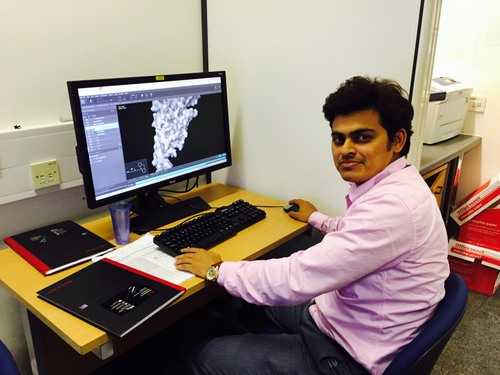 Shaikh participates in a drug design project against the Ebola virus
Shaikh participates in a drug design project against the Ebola virus
Mr Faraz Mohammadali Shaikh, a doctoral student from the University of Macau (UM) Faculty of Science and Technology (FST), has received an internship offer from the Wellcome Trust Centre for Human Genetics at the University of Oxford, United Kingdom. Shaikh will participate in a drug design project against the Ebola virus. Ebola is a highly virulent pathogen which can cause a severe hemorrhagic fever with a high death rate. Shaikh will work on the computational methods for designing drugs against Ebola. He will use computer simulations and fragment-based molecular docking to explore viral activity – in particular how the virus enters the host cell – at the atomic level, and investigate ways to effectively inhibit virus attachment and membrane fusion. The goal of this research project is to identify chemical entities as potential candidates for developing drugs against Ebola. This project is headed by Prof David Stuart, director of Oxford’s Division of Structural Biology. The world-class research group at the division has been focused on solving the complex problem of structure-function relationship of viruses of different sizes, and the puzzles of virus-receptor interactions and virus assembly, with innovative experimental and computational techniques. Shaikh has been working on protein flexibility algorithms and drug design applications in the Computational Biology and Bioinformatics Lab, headed by Dr Shirley Siu Weng In, since September 2015. He has worked as a senior research fellow at the Centre of Excellence at the National Facility for Drug Discovery Complex, Rajkot, India. He received the DBT Senior Research Fellowship from the Indian government from 2013 to 2015. So far he has published more than ten papers in international journals.
View gallery


